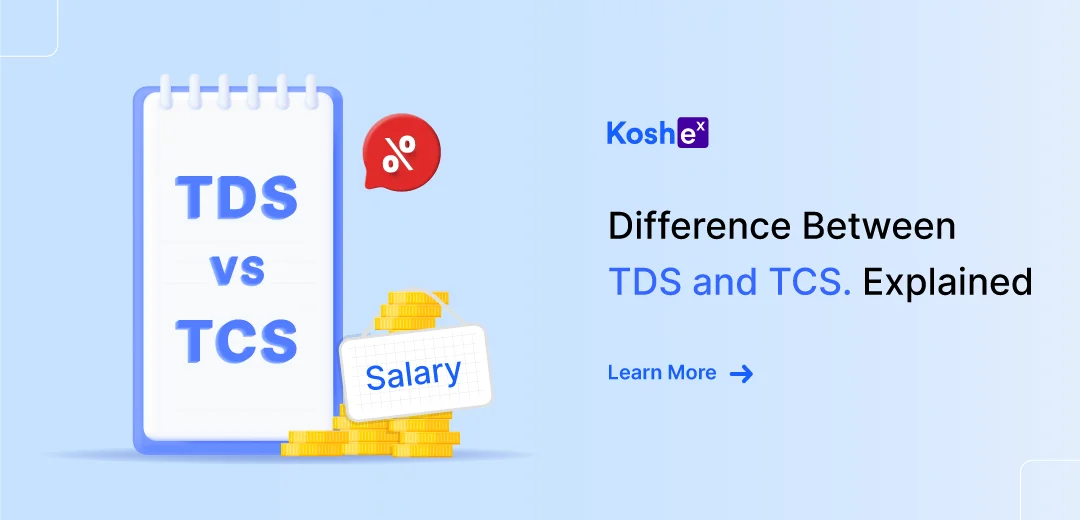TDS and TCS are the most important taxes levied by the Indian government. These taxes must be deducted or collected and deposited with the respective authorities of the government. These two terms might sound the same but they have different meanings.
What Is TDS?
TDS stands for Tax Deducted At Source. It is the tax amount that the government collects directly from the recipient’s income immediately when it is earned.
As per Section 194Q, the income tax department mandates any company or individual to deduct tax at the source if the payment exceeds ₹50 lakhs for the purchase of goods and services such as rent, consulting, legal fees, royalty, technical services, etc.
The Government decides the TDS rates under the Income Tax Act. In any TDS transaction, the company or individual deducting TDS from the payment is called a deductor, and the company or person receiving the said payment is called the deductee.
Let’s understand TDS with an example. You are paying a rent of ₹60,000 for your office to a property owner. In a year, you will be paying a total rent of ₹7,20,000.
The TDS rate that is applicable here is 10%. So, the actual rent paid to the owner will be ₹54,000 (₹60,000 – 10%*60,000). Thus, the TDS amount of ₹6,000 will be deducted every month as the total amount of rent is beyond the tax-free limit of ₹2,50,000.
What Is TCS?
TCS stands for Tax Collected At Source. It is a tax collected by the seller at the time of the sale of specified goods to a buyer. Section 206C of the Income Tax Act, 1961 specifies the goods and services on which TCS is applicable. The threshold for TCS on the sale of goods is ₹50 lakhs.
The sale of goods does not cover the export of goods such as tendu leaves, forest produce, alcohol, and scrap – under Section 206C (1), the export of motor vehicles – under Section 206C (1F), and foreign remittance – under Section 206C (1G).
TCS is not required to be deducted if the buyer is a Central Government employee, State Government employee, employee at High Commission, Embassy, Local Authority, Consulate, etc. This provision also does not apply to imports.
Let’s understand TCS with an example. If you sell products such as tendu leaves worth ₹60,000 to a buyer, you will collect the following amount of TCS. The TCS rate applicable is 5%, so the actual price paid by the buyer would be ₹63,000 (₹60,000 + 5% * 60,000). Thus, you will collect ₹3,000 as TCS.
What Is The Difference Between TDS And TCS?
Below are the differences between TDS and TCS.
| Parameters | TDS | TCS |
| Definition | TDS denotes tax deducted at source by any individual or entity while making a payment if the payment exceeds the threshold amounts mentioned as per applicable provisions of the Income Tax Act | TCS denotes tax that has to be collected by the seller at the time of sale |
| Transactions Covered | TDS is applicable on interest, salaries, brokerage, professional fees, commission, purchase of goods, rent, etc. | TCS is applicable on the sale of timber, scrap, minerals, liquor, tendu leaves, forest produce, cars, and toll tickets |
| Limits | Under Section 194Q, TDS is applicable on the purchase of goods if the amount exceeds ₹50 lakhs | Under Section 206C (1H), TCS is applicable on the sale of goods if the amount exceeds ₹50 lakhs |
| Time Of Deduction | When payment is due or made, whichever comes sooner | At the time of sale |
| Due Dates | The due date for depositing TDS is the 7th of every month, though the returns have to be submitted quarterly | TCS is deducted during the month in which the supply is made. It will be deposited within 10 days from the end of the month of supply to the credit of the government |
| Filing Quarterly Statements | There are three different returns to be filed for TDS: Form 24Q (on salaries), Form 26Q (other than salaries), and Form 27Q (payments made to NRIs) | There is one quarterly return in Form 27EQ for collection of tax at source (TCS) |
| Person Responsible | TDS will be deducted by the individual (or company) making the payment | TCS will be collected by the individual (or company) selling the specified goods |
| Unavailability Of PAN | As per Section 206 AA, those who fail to provide a PAN (Permanent Account Number) to the person making the payment will be charged TDS at the following rate, whichever is higher:*) The rate specified in the corresponding provision of the Act;*) Rate of 20% | Section 206CC requires anyone paying an amount liable to TCS to provide their (PAN) to the person responsible for collecting the tax; otherwise, the tax will be collected at the following rate, whichever is higher:*) twice the rate specified in the corresponding provision of this Act;*) rate of 5% |
What Is The Penalty For Non-Compliance?
As per provisions of Section 271H, the deductor or the collector of the taxes is liable to face legal consequences if they fail to deposit TDS or TCS on time. A fine ranging from ₹10,000 to ₹1,00,000 may be imposed as a failure to deposit the taxes.
As per provisions of Section 271H, the deductor or the collector of the taxes is liable to face legal consequences if they fail to deposit TDS or TCS on time.
A fine ranging from ₹10,000 to ₹1,00,000 may be imposed as a failure to deposit the taxes. For TCS, the rate of interest levied is 1.00% for any delay in the deposit of TCS. Apart from that, the individual may also be imprisoned for 3 to 7 years.
It is important for an individual or a company to fulfill their tax obligations on time. If excess TDS has been deducted from your income, you can get a refund, if you file your income tax returns on time. Also, if you have collected TCS, you should make sure that the collected TCS is deposited with government-designated banks on time.
In The End
It is important to keep track of all your taxes. In case TDS has been deducted from your income, you can get refunds if you file your returns on time.
If you have collected TCS, you should make sure that the collected TCS is deposited with the authorities to ensure the lawful functioning of your business.
If you are an individual, you can also save taxes via other means like tax deductions through life insurance, mutual funds, and other tax-saving instruments.
We hope you are able to understand the differences between TCS and TDS through this blog. If you wish to learn about investment instruments like Mutual Funds, Fixed Deposits, Digital Gold, and Smart Deposits, please head over to our Blogs section.
We also write informative blogs on money management, savings, and investments.
Koshex is designed to help every Indian investor achieve their goal. With our state-of-the-art platform, you can track your expenses, save smartly, and invest in personalized investment recommendations free of cost. Sign up with Koshex today and simplify your financial life today!









Leave a Comment